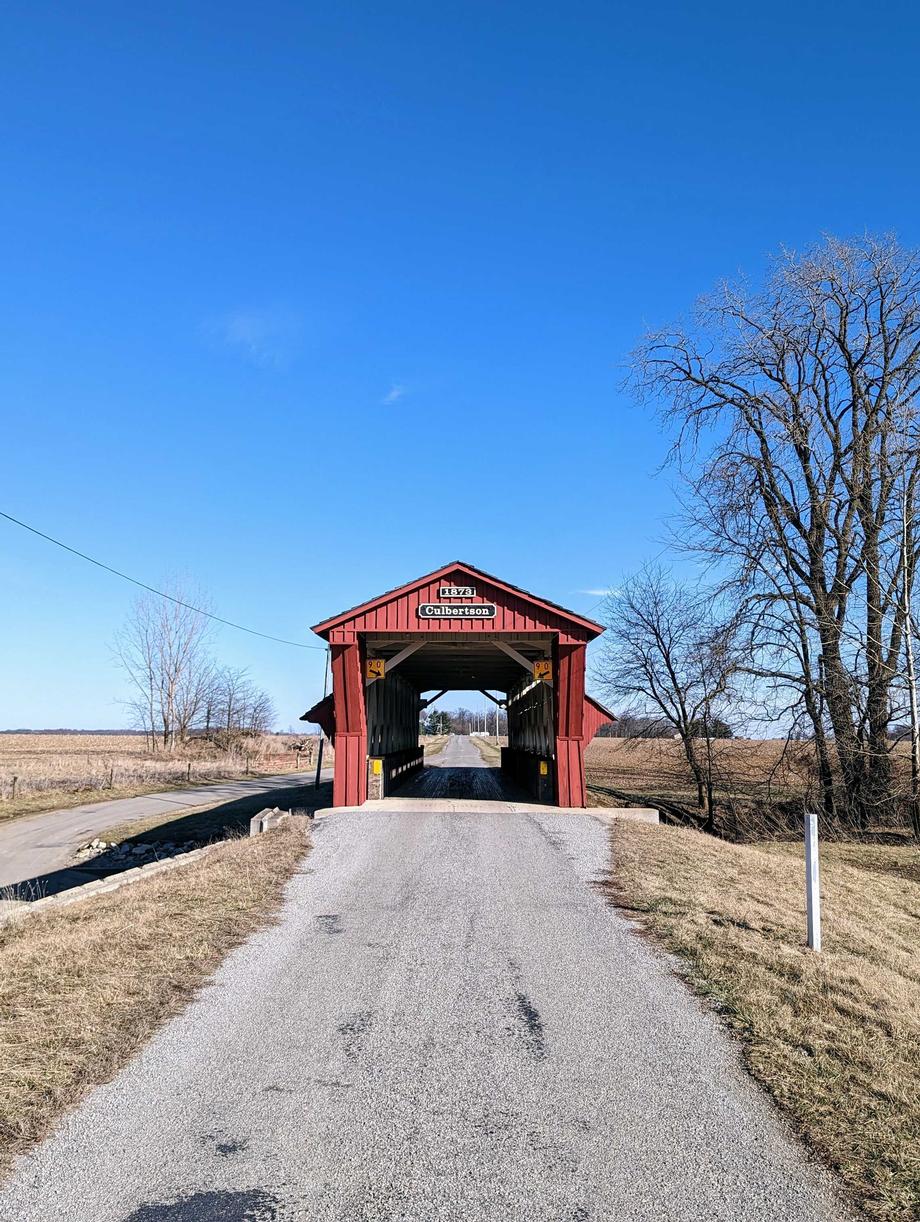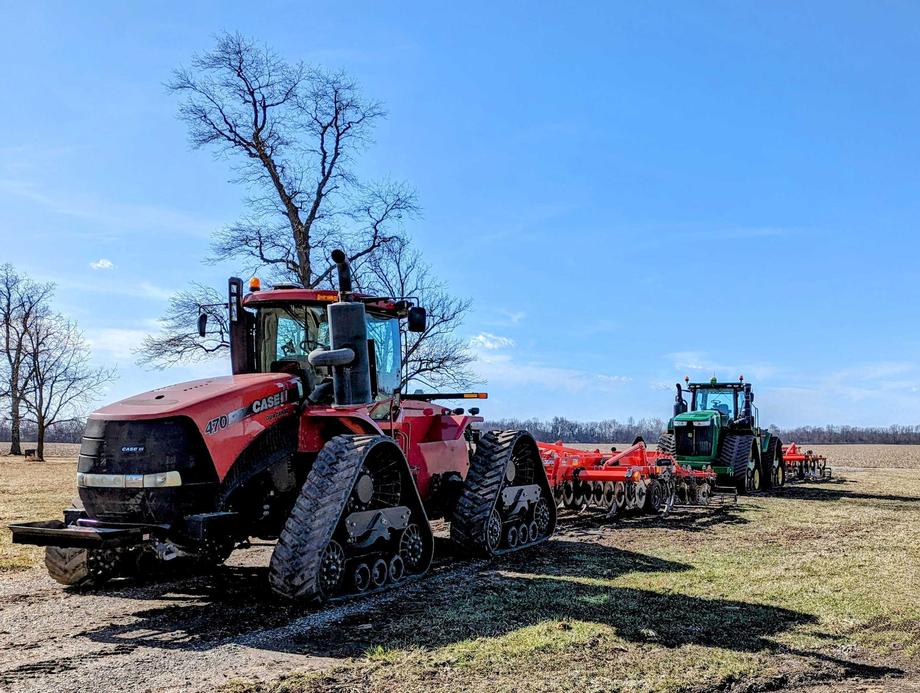 When you make the turn off the county road and pass through the covered bridge that leads to the Adams Brother’s farm, you know that you’re driving up to something special.
When you make the turn off the county road and pass through the covered bridge that leads to the Adams Brother’s farm, you know that you’re driving up to something special.
The Adams family has been cultivating this land since the 1950s when the family’s patriarch bought just over two hundred acres of farmland and woods. Over the decades since then the farm has grown to more than five thousand acres and Mike, the oldest of the seven Adams kids, has taken over management of the operation.
Mike started learning the ways of a farmer when he was just a kid, barely old enough to reach the clutch on the tractor, but he took to it quickly and easily. Throughout his childhood he learned the mechanics of running a farm from his dad and those skills stuck with him even as he went off to college to study accounting. So, when the elder Adams got sick and the time came for the kids to take things over he naturally stepped into the role, along with his younger brother Roy. Although he was also holding two other jobs to support his family while running the farm in his younger days, Mike says that it was just the right choice for he and Roy to step up and run the business, even though it meant a lot of 16 or 20 hour days.
Nowadays, Mike isn’t working that many hours anymore. He’s got his son, Jeff – who joined the family business after college – and a full stable of farm hands that make his workload lighter. Additionally, the advent of technology has made the art of farming much more efficient. With GPS, cloud technology, and other advancements they can plant the whole 5200 acres in eight to ten 12-hour days when it used to take weeks of long, hard days. Adams Brothers mainly grows corn, soybeans, and organic alfalfa, but they also produce parent seed – which is used to make commercial seed. Their yearly output is around five hundred thousand bushels and they focus on quality, which keeps their reputation intact and revenue per bushel as high as possible.
 Mike doesn’t consider the physical size of the farm large, per se, but instead says that they’re an average size. All of their fields are within a 5-mile radius of the barns and offices, and the fields are all fairly large – which lends itself to increased efficiency. “We’re not driving all over the county to get to the fields,” Mike says.
Mike doesn’t consider the physical size of the farm large, per se, but instead says that they’re an average size. All of their fields are within a 5-mile radius of the barns and offices, and the fields are all fairly large – which lends itself to increased efficiency. “We’re not driving all over the county to get to the fields,” Mike says.
Sitting in the workshop surrounded by charts and maps hanging on the walls, Mike doesn’t hesitate to say that it’s unclear when asked about the future of the farming industry in America. “There’s nobody coming up,” he says. “Startup costs, the cost of equipment, it’s all so much – they can’t get ahead. Even input costs are prohibitive since they can run $1000 per acre.” He then goes on to mention the safety risks of working around heavy equipment and although the automation can increase efficiency it can also lead to accidents if the operator doesn’t pay close attention. “I’ve heard of guys not watching closely and rolling their tractors.”
Mike does note, with some enthusiasm, that the future of farming is in technology. From the GPS and automation that control the equipment to the development of AI tools that will streamline the process even more, technology is growing in farming. And although everything is becoming more tech-driven, he can’t ignore the costs. “It’s all very expensive.”
As for his operation Mike says that, because they’re well established, they’re in a good place. “We’ve been building for the future for a long time, keeping our cashflow healthy and watching the markets closely.” But he won’t deny that there are many factors that make growth and sustainability difficult – from the cost of seed to competition from China and the destruction of solar energy projects on farmland.
 “Those projects are taking up good ground, ground that will never be farmed again,” he says of the solar farms that are popping up or being planned around his land in Champaign, Madison, and Union counties. He’s concerned about the effects that solar projects will have on the farmland that surrounds his farmland. Sure, he says the scientists all claim that there’s nothing to worry about but the reflection from the mirrors and the irreparable damage to the ground give him pause. “Some of these solar farms are just stupid,” he says.
“Those projects are taking up good ground, ground that will never be farmed again,” he says of the solar farms that are popping up or being planned around his land in Champaign, Madison, and Union counties. He’s concerned about the effects that solar projects will have on the farmland that surrounds his farmland. Sure, he says the scientists all claim that there’s nothing to worry about but the reflection from the mirrors and the irreparable damage to the ground give him pause. “Some of these solar farms are just stupid,” he says.
When asked if he’s given any thought to getting in on the solar boom, Mike just laughs. “We didn’t get into this for the money.”
When he’s not working the farm himself or supervising the work – on the day of our conversation his men were clearing brush to make space for a new building – Mike enjoys living the life of a doting grandfather and a stand-up member of the community. He coaches baseball, serves on the livestock committee, and generally gives back to those around him. His wife was a teacher in the local school system and all of his three children are involved one way or another in the community. It’s a big part of their lives. “Everyone is settled in,” he says. “We’re doing this for the grandkids.”
Mike is positive that he’s been able to be so successful and build a strong business because of the strengths of the American capitalist system. And although he doesn’t watch the markets closely, or even always agree with Dan’s opinions, he knows that building and maintaining a strong portfolio is important for the future of his family. “I use futures to hedge my price, cost, and weather risk but it’s the capital market that drives pricing. It gives us free will,” he said. “The ability to cover our butts and not put the family at risk in the lean times.”
 Though he’s no longer a spring chicken and enjoys getting away to the beach or to play golf sometimes, Mike says he’s not ready to quit yet. “I only work from 7am to dark these days, no more of those long days like so many years ago. I can keep going.”
Though he’s no longer a spring chicken and enjoys getting away to the beach or to play golf sometimes, Mike says he’s not ready to quit yet. “I only work from 7am to dark these days, no more of those long days like so many years ago. I can keep going.”
Mike's son, Jeff, may be picking up the family mantle sooner than he thought. Like father, like son.
